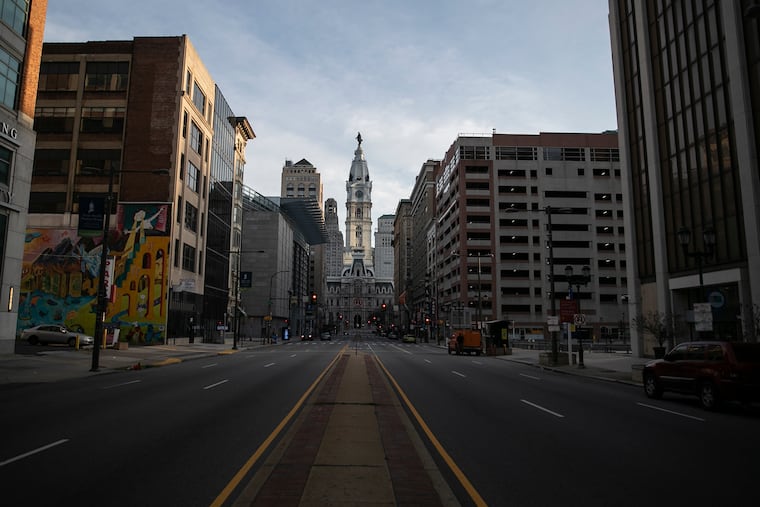1 in 4 Philadelphians knows someone who has died of COVID-19, and nearly half have lost jobs or wages, Pew study says
Coronavirus hardships have had a disproportionate impact on Philadelphians of color, a study found — while respect for police and confidence in safety has declined.

A quarter of Philadelphia residents know someone who has died of COVID-19, half the population has struggled to pay bills or has had other financial hardship, 40% have lost work or wages, and more than half worry they could catch the coronavirus at work.
Those are some of the results of a new Pew survey of 1,025 Philadelphians about the unprecedented year and its overlapping pressures — the pandemic, racial justice protests, gun violence, and the economic downturn.
The coronavirus' associated hardships have often had a disproportionate impact on the city’s nonwhite residents, the survey indicates.
Just 17% of respondents said they believed their family would return to their pre-pandemic way of life within the next six months or sooner, and a quarter said things would “never get back to the way they were before.”
A majority expressed an unfavorable view of the city’s and Police Department’s handling of the protests, though most approved of the city and state responses to the pandemic. And, the survey indicated, at least some feel Philadelphia has become an overall less desirable place to live.
“Obviously this has been a tumultuous year and we thought it was important to quantify what Philadelphians have been through and how they feel about it,” said Larry Eichel, senior adviser with the Pew Charitable Trusts' Philadelphia research and policy initiative. “The pandemic has hit Philadelphians hard in ways that affect their jobs, their economic security, and their mental and physical health.”
A “unique and unprecedented point” in history
Nearly 60% said they approved of how Mayor Jim Kenney and other city officials have handled the pandemic, and 66% approved of how Gov. Tom Wolf and state officials have responded.
“The poll is just a snapshot in time, and taken at a really unique and unprecedented point in the city’s history,” said Maari Porter, deputy chief of staff for policy and strategic initiatives in Kenney’s administration. “I think the poll also reflects what many of us feel to be instinctively true.”
The survey, which was conducted by mail between July 27 and Aug. 24, found that nearly 60% of Philadelphians knew someone who has tested positive for the virus. But while 12% of white residents knew someone who has died of the coronavirus, one-third of Hispanic and Black survey respondents said the same.
Existing disparities for people of color caused by racial inequity in health care and other systems in the United States have exacerbated the coronavirus pandemic for minorities, particularly Black people, who have the highest death rate of any racial group in Philadelphia, according to city data.
» READ MORE: Breaking down the toll of Philly’s coronavirus hospitalizations by race, age, and neighborhood
Half of all city residents said they had experienced some kind of economic hardship: A third of white people reported financial challenges, compared with 75% of Hispanic and 55% of Black residents. The survey counted residents identifying as Asian or with any other racial groups in an “other” category; of those, 53% reported financial hardship.
“It’s devastating, but a reflection of the deep systemic racism that we have in our nation and also in our city,” Porter said of the pandemic’s disproportionate impact. She said the Kenney administration will continue providing testing and other resources to communities of color.
A quarter of respondents said they had fallen behind on paying rent or mortgage due to the pandemic. More than a quarter said they had faced problems paying for food.
Those with lower incomes were also hit harder than higher wage earners and more frequently lost their jobs or lost pay or work hours. Sixty percent of people earning less than $30,000 were laid off, were furloughed, had hours cut, had pay reduced, or had a business close — compared with a third or lower for people in higher income brackets.
Porter said the poll reinforces the need for a new federal stimulus package. While the city has done some of its own tracking of unemployment numbers, she said the Pew survey provided additional insight into the number of residents who lost work hours or had pay cuts.
About 44% of Philadelphians said they had been unable to work remotely, but again, the numbers revealed inequity: The vast majority of people with college degrees and white people did work from home, while the majority of residents with less schooling and the majority of Black residents said they were unable to do so.
“Our survey found that in a lot of ways, Hispanics and Black Philadelphians have been hit harder by the pandemic’s impact,” Eichel said.
Many said public safety was a top concern, and the percentage of residents who feel safe in their neighborhoods — 49% — was the lowest it has been in a decade of polling, Eichel said — but reasons, which were not collected in the survey, could vary widely.
Overall, the coronavirus has made the city “less attractive” to 43% of respondents, and 44% said the social justice demonstrations and the city’s handling of them had the same effect.
“Our results suggest that there’s been some deterioration in residents' view of the city’s desirability as a place to live," Eichel said, “but it’s impossible to know how deep those changes are and whether they’ll be long-lasting.”